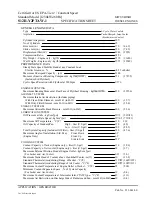
10.5
Section 10
Reassembly
10
Install Connecting Rods with Pistons and
Rings
NOTE
: The cylinders are numbered on the
crankcase. Make sure to install the piston,
connecting rod and end cap into the
appropriate cylinder bore as previously
marked at disassembly.
Do not
mix the end
caps and connecting rods.
NOTE
: Proper orientation of the piston/connecting
rod assemblies inside the engine is extremely
important. Improper orientation can cause
extensive wear or damage. Be certain the
pistons and connecting rods are assembled
exactly as shown in Figure 10-17.
Figure 10-18. FLY Mark on Piston.
Figure 10-17. Piston and Connecting Rod
Orientation.
1. Stagger the piston rings in the grooves until the
end gaps are 120° apart. The oil ring rails should
also be staggered.
2. Lubricate the cylinder bore, piston, and piston
rings with engine oil. Compress the rings of the
#1 piston using a piston ring compressor.
3. Lubricate the crankshaft journals and connecting
rod bearing surfaces with engine oil.
4. Make sure the
FLY
stamping on the piston is
facing toward the flywheel side of the engine. See
Figure 10-18. Use a hammer with a rubber grip
and gently tap the piston into the cylinder as
shown in Figure 10-19. Be careful that the oil ring
rails do not spring free between the bottom of the
ring compressor and top of the cylinder.
Figure 10-19. Installing Piston Assembly Using Ring
Compressor Tool.
5. Install the inner rod cap to the connecting rod
using the two hex flange screws. Torque the
screws in increments to
11.3 N·m (100 in. lb.)
.
Illustrated instructions are provided in the
service rod package. See Figure 10-20.
NOTE
: Align the chamfer of the connecting rod
with the chamfer of its mating end cap.
When installed, the flat faces of the
connecting rods should face each other.
The faces with the raised rib should be
toward the outside.
No. 1 Side
No. 2 Side
Figure 10-20. Torquing Connecting Rod End Cap
Screws.
















































